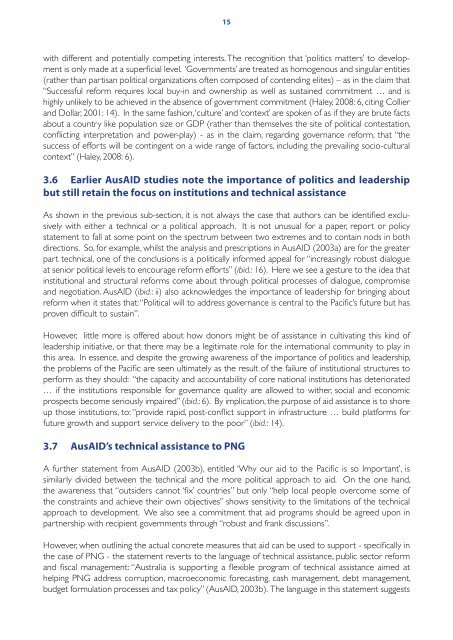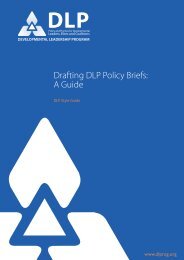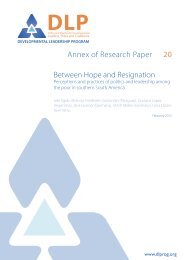VIEW - The Developmental Leadership Program
VIEW - The Developmental Leadership Program
VIEW - The Developmental Leadership Program
Create successful ePaper yourself
Turn your PDF publications into a flip-book with our unique Google optimized e-Paper software.
15with different and potentially competing interests. <strong>The</strong> recognition that ‘politics matters’ to developmentis only made at a superficial level. ‘Governments’ are treated as homogenous and singular entities(rather than partisan political organizations often composed of contending elites) – as in the claim that“Successful reform requires local buy-in and ownership as well as sustained commitment … and ishighly unlikely to be achieved in the absence of government commitment (Haley, 2008: 6, citing Collierand Dollar, 2001: 14). In the same fashion, ‘culture’ and ‘context’ are spoken of as if they are brute factsabout a country like population size or GDP (rather than themselves the site of political contestation,conflicting interpretation and power-play) - as in the claim, regarding governance reform, that “thesuccess of efforts will be contingent on a wide range of factors, including the prevailing socio-culturalcontext” (Haley, 2008: 6).3.6 Earlier AusAID studies note the importance of politics and leadershipbut still retain the focus on institutions and technical assistanceAs shown in the previous sub-section, it is not always the case that authors can be identified exclusivelywith either a technical or a political approach. It is not unusual for a paper, report or policystatement to fall at some point on the spectrum between two extremes and to contain nods in bothdirections. So, for example, whilst the analysis and prescriptions in AusAID (2003a) are for the greaterpart technical, one of the conclusions is a politically informed appeal for “increasingly robust dialogueat senior political levels to encourage reform efforts” (ibid.: 16). Here we see a gesture to the idea thatinstitutional and structural reforms come about through political processes of dialogue, compromiseand negotiation. AusAID (ibid.: ii) also acknowledges the importance of leadership for bringing aboutreform when it states that: “Political will to address governance is central to the Pacific’s future but hasproven difficult to sustain”.However, little more is offered about how donors might be of assistance in cultivating this kind ofleadership initiative, or that there may be a legitimate role for the international community to play inthis area. In essence, and despite the growing awareness of the importance of politics and leadership,the problems of the Pacific are seen ultimately as the result of the failure of institutional structures toperform as they should: “the capacity and accountability of core national institutions has deteriorated… if the institutions responsible for governance quality are allowed to wither, social and economicprospects become seriously impaired” (ibid.: 6). By implication, the purpose of aid assistance is to shoreup those institutions, to: “provide rapid, post-conflict support in infrastructure … build platforms forfuture growth and support service delivery to the poor” (ibid.: 14).3.7 AusAID’s technical assistance to PNGA further statement from AusAID (2003b), entitled ‘Why our aid to the Pacific is so Important’, issimilarly divided between the technical and the more political approach to aid. On the one hand,the awareness that “outsiders cannot ‘fix’ countries” but only “help local people overcome some ofthe constraints and achieve their own objectives” shows sensitivity to the limitations of the technicalapproach to development. We also see a commitment that aid programs should be agreed upon inpartnership with recipient governments through “robust and frank discussions”.However, when outlining the actual concrete measures that aid can be used to support - specifically inthe case of PNG - the statement reverts to the language of technical assistance, public sector reformand fiscal management: “Australia is supporting a flexible program of technical assistance aimed athelping PNG address corruption, macroeconomic forecasting, cash management, debt management,budget formulation processes and tax policy” (AusAID, 2003b). <strong>The</strong> language in this statement suggests




